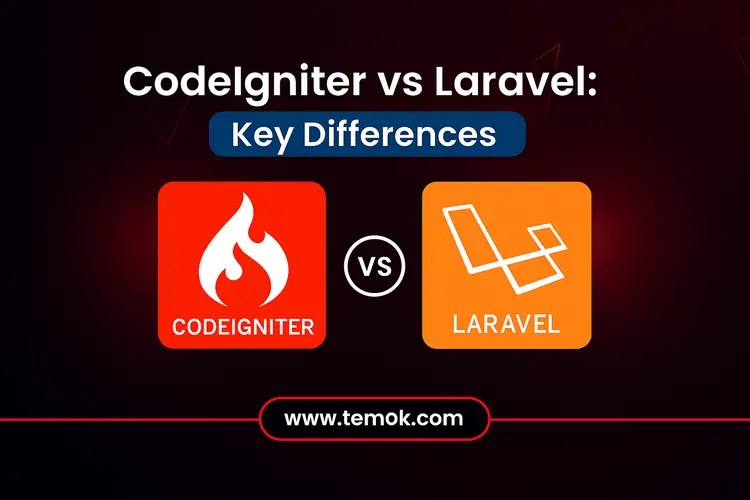Selecting the appropriate PHP framework is a challenge that many developers face. Because there are so many of them, this might become a headache. The two most talked-about are CodeIgniter vs Laravel. Each has a sizable following of sincere believers and has been around for a few years.
The PHP reign on the internet is unbroken. 79% of all websites are powered by it to some extent. To increase PHP’s flexibility, developers grouped and packaged several frequently used PHP functions into what are known as PHP frameworks. The most important question is: Which will prove superior in 2025, CodeIgniter or Laravel? If you are a developer or wish to create a web application, this is an important decision. You can make the best decision if you are aware of the advantages and disadvantages.
So, keep exploring to learn which is better between Laravel vs CodeIgniter in 2025.

Table of Contents
Laravel vs CodeIgniter: Understanding The Frameworks
Before we jump into the Laravel vs CodeIgniter comparison, it is better to discuss what these frameworks are.
What is Laravel?
Laravel is a PHP framework that automates PHP and facilitates the development process for developers. To spare you the bother of beginning from scratch while creating a PHP application, it offers a variety of components and templates.
Laravel serves by many developers to speed up their development process because of its robust ecosystem and abundance of compatible packages and extensions. PHP is now speedier thanks to Laravel, which has also enabled developers to advance it. Actually, Laravel kept PHP from going extinct.
Some people think that PHP is dead. However, PHP programming sometimes lacked defined structures and procedures prior to the Laravel framework. Code discrepancies resulted from developers’ frequent reliance on different libraries during the development process. Along with new ideas like routing, template engines, ORM (Object-Relational Mapping), and more, Laravel has given PHP development structure.
Laravel simplifies database migration, unit testing, and other tasks with its integrated tools. Similar to CodeIgniter, it focuses on an MVC framework, allowing explicit code separation, autonomous development, and easy maintenance. Check out our blog to learn more about what is Laravel. Now let’s discuss CodeIgniter before going into the main CodeIgniter vs Laravel comparison.
What is CodeIgniter?
Like other PHP frameworks, the PHP CI framework keeps you from writing the same PHP code over and over again. But even though it’s a PHP framework, it offers better speed and an impressively small footprint.
You want a straightforward yet attractive PHP toolkit to build a fully working web application, PHP CodeIgniter is the ideal option. Additionally, despite the fact that a number of different PHP web frameworks are comparable, PHP CodeIgniter is a market leader due to its numerous advantages.
An already-built database connectivity library is included with this PHP framework. Additionally, it provides a standard collection of libraries that include every feature a developer could possibly require for web development.
On top of that, it includes a vast variety of plugins, aids, and other resources. Using PHP CodeIgniter lets developers simplify complicated operations while retaining great app performance. Additionally, the PHP CI framework architecture encourages adaptability and creativity due to its foundation in the MVC design pattern. Now let’s head towards our main Laravel vs CodeIgniter, which is an easy comparison.
CodeIgniter vs Laravel: Key Differences

Here are the key CodeIgniter vs Laravel differences you must know before choosing the right one in 2025:
Performance
Performance is another major factor. While comparing Laravel vs CodeIgniter performance, Laravel always wins out over CodeIgniter performance because of its broad built-in capabilities and its ability to be driven successfully with the appropriate optimization techniques. On the other hand, CodeIgniter’s architecture makes it lightweight by default, which usually results in greater performance right out of the box. In Laravel vs CodeIgniter, which is an easy competition, Laravel is easy to use.
If you’re looking for something that can easily handle heavy traffic and speed is a top priority for you, CodeIgniter might serve as a better option. Having said that, Laravel has made a few improvements over the years to help speed things up, and it also features several caching methods that will help you speed things up even more. Also, check out our premium Laravel managed cloud hosting services in 2025!
Built-in Modules
To expedite development, you may break up large web programs into smaller components. There are notable differences between Laravel vs CodeIgniter about built-in modules.
There is no modular functionality available in CodeIgniter. As a result, breaking down projects into distinct functional components is difficult.
You may divide a larger project into smaller modules with Laravel’s built-in module functionality. Working on separate parts of a project without having to deal with the project as a whole is made possible by the split.
The fact that a modular approach includes a folder organization is another important advantage. Your features are arranged in an excellent directory structure. As a result, you may avoid having feature-specific classes, models, configurations, translations, etc. that overlap with other modules.
Support for Databases
In the CodeIgniter vs Laravel comparison, Laravel supports several databases, including SQL Server, SQLite, PostgreSQL and MySQL. You may deal with several database systems and ease database operations with its eloquent ORM and fluid syntax.
Additionally, CodeIgniter works with a number of databases, such as MySQL, PostgreSQL, SQLite, MongoDB, Oracle, and others. You can easily interface with different database systems thanks to its straightforward query builder. Compared to Laravel, CodeIgniter’s querying methodology is simpler to use, while being more conventional.
Security
With all of its built-in capabilities, Laravel is the best in terms of security. It offers defense against the most prevalent kinds of vulnerabilities, including cross-site scripting, SQL injection, and cross-site request forgery, or CSRF. One of the main reasons web developers who want high security attention should use Laravel is the out-of-the-box security it offers. A cheap SSL certificate is still a necessary security step for any online site, even with Laravel’s built-in security capabilities.
While CodeIgniter has some intriguing security features as well, they are not as comprehensive as those of Laravel. To protect the CodeIgniter app, more work is needed. Laravel safeguards apps more easily and consistently, which is more convenient for developers who require more time.
Also Read: Django vs Laravel: Which Backend Framework is Better?
Handling Errors
The process by which a software bounces back from an error and resumes its regular operations is known as error management. It foresees, finds, and corrects communication, programming, and application errors.
Although both CodeIgniter vs Laravel have error-handling mechanisms, they take different approaches to log notifications.
CodeIgniter provides a simple error-handling system. All development and testing problems are shown, but none in production. You may modify this by amending the .env file and setting the CI ENVIRONMENT variable.
Three errors which CodeIgniter produces are:
- Messages of error
- Debugging messages
- Informational communications
You may store errors as text files using CodeIgniter’s error logging capability. It produces error warnings irrespective of the function scope or class. This image illustrates the Laravel error handling process using a workflow diagram that explains each step in turn, including the error handler, ON EXCEPTION, and try…catch. A built-in error-handling mechanism in Laravel will alert you to any errors. Errors and exceptions are automatically detected, logged, and sent to you for further action.
The App\Exceptions\Handler class contains the exception logs. There are two methods in the class:
- report() technique
- render() technique
Community Support

Community support is one of the factors that determines how well a framework works for you overall, and Laravel has a fantastic and vibrant community. Because there are so many forums, guides, and programs accessible, you may be very certain that someone else has previously addressed your problem.
However, the Laravel community is generally welcoming and hot. Compared to Laravel, the CodeIgniter community is smaller and more active. You can still find a solution if you need one, though. CodeIgniter still has a wealth of resources available, and because of its simpler design, it’s frequently simpler to pinpoint malfunctions. So, CodeIgniter is a winner in this section of our CodeIgniter vs Laravel comparison.
Also Read: Laravel Best Security Practices: An Overview
Use in the Real World
In the real world, the demands of the project determine whether to use CodeIgniter or Laravel. Usually, complicated, large-scale projects employ Laravel. Because of its great resourcefulness and scalability, it is ideal for tasks requiring a high level of functionality.
Businesses that want to create enterprise-level apps frequently use Laravel. CodeIgniter is a popular choice for short projects or situations where time is limited because of its ease of use and speed. If you are the type of developer who prefers simple development, this is also the ideal choice. Either of these frameworks could work better, depending on the needs of the project.
Popularity and Job Market
Laravel vs CodeIgniter are the most popular among PHP frameworks. Every framework has a user base that has selected it in part because of its importance.
CodeIgniter is the 2nd most popular PHP framework behind Laravel, according to several statistics. On GitHub, CodeIgniter has 18.2k stars.
Many big, major businesses depend on CodeIgniter, even if certain experts might be less inclined to use it as their tool. Companies using CodeIgniter include Unified Infotech, Zendesk, Space India, Casio Computer Co., Nissan, and McClatchy, suggesting a steady and bright future for developers. Also, check out our premium managed PHP cloud hosting services in 2025!
CodeIgniter engineers in the US make between $66,000 and $105,000 a year, according to ZipRecruiter’s compensation statistics.
On the other hand of CodeIgniter vs Laravel, according to a study by JetBrains, 50% of PHP users are now using Laravel. Professionals particularly adore its remarkable stability and capacity to manage large, intricate systems.
Data collected from internet discussion forums, social media, and a variety of technological sources indicates that it is quite popular. Laravel, for example, has 71. 2K stars on GitHub, showing how well-known the platform is.
Conclusion
So, which of CodeIgniter vs Laravel prevails? Answering this question with a simple yes/no is difficult. Laravel is ideal for large and complicated projects because of its unique features, superior community support, and scalability. On the other hand, CodeIgniter incorporates simplicity, quickness, and ease of use—something that one beginning on a tiny project only requires or wants to get started quickly. Comment below about Laravel vs CodeIgniter which is better, you think, in 2025.
FAQs (Frequently Asked Questions)
Is Laravel Better Than CodeIgniter?
More legible and tidy routes are made possible by Laravel’s more expressive and adaptable routing architecture. Additionally, it has built-in tools for handling common HTTP verbs.
Why Is CodeIgniter Not Popular?
In addition to having obsolete architecture, CodeIgniter lacks contemporary functionality. It has a small community. Moreover, it has an eclipse which is more reliable frameworks like Laravel.
Is CodeIgniter Outdated?
Although CodeIgniter does not seem out-of-date, its applicability varies depending on the particular project requirements and team experience.
Is CodeIgniter Dead Or Not?
Although CodeIgniter is still in use, its name has come to represent a subpar solution. For this reason, we suggest Laravel as a superior choice. The PHP frameworks, CodeIgniter vs Laravel, are both open-source.
